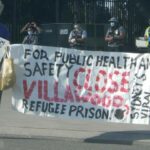Crime Commission Denies Child Terrorism Suspect Basic Protections

The NSW Crime Commission is an independent statutory body which aims to investigate serious criminal activity and obtain evidence which may lead to a prosecution.
It has a wide range of powers – including the ability to summon persons of interest to answer questions about suspected criminal activity without charging them with any offence. Importantly, there is no ‘right of silence’ at the Crime Commission – meaning that those in possession of information may be forced to disclose what they know.
But a new case is set to test the Commission’s powers, with a 16-year-old terrorism suspect arguing that he was denied natural justice when being interviewed by the Commission.
Crime Commission Interrogates Child Terrorism Suspect
The case centres around a 16-year-old boy who was alleged to have spoken to terrorist recruiter Mohamed Baryalei.
The Crime Commission summoned the boy to an interview where he was questioned about his knowledge and involvement in terrorism groups.
But the boy is now arguing that the Commission overstepped the mark by not considering his special interests as a child when conducting the interview with him – an interview which could have serious consequences, including the possibility of being charged with terrorism-related offences.
What Powers Does the Crime Commission Have?
The case casts doubt on the extent of the Commission’s powers, which until now have been relatively dubious. Section 8 of the New South Wales Crime Commission Act 1985 (‘the Act’) demonstrates just how broad these powers are:
‘The Commission has power to do all things necessary to be done for or in connection with, or reasonably incidental to, the exercise of its functions, and any specific powers conferred on the Commission by this Act shall not be taken to limit by implication the generality of this section.’
This section is complemented by section 13A of the Act, which states that the normal rules of evidence (which apply in Courts and promote a fair trial) do not apply in proceedings before the Commission.
Section 13, which deals with the Commission’s ability to hold hearings, further broadens the powers of the Commission – stating that it can direct that evidence, documents and other things produced not be published.
Finally, section 13B states that the Commission can refuse to allow a witness to be represented by a lawyer if ‘it believes on reasonable grounds and in good faith that to allow representation by the particular legal practitioner will, or is likely to, prejudice its investigation.’
A Breach of Natural Justice?
Despite the overarching powers of the Commission, many argue that it should not be exempt from the checks and balances which universally apply to all judicial bodies.
Natural justice, also known as ‘procedural fairness’, is an important tenet of the criminal justice system which seeks to ensure that suspects are given a fair and unbiased hearing, and the right to be heard.
Domestic laws and international conventions recognise that children should be afforded special legal rights due to their vulnerability. For instance, the UN Convention on the Rights of the Child says that matters concerning children should give regard to the best interests of the child as a primary consideration.
Here in NSW, the Children (Criminal Proceedings) Act 1987 (NSW) contains various provisions which apply to Children’s Court cases, including that ‘children who commit offences bear responsibility for their actions but, because of their state of dependency and immaturity, require guidance and assistance.’
Given that these provisions apply to court cases involving children, it seems natural that investigative bodies such as the Crime Commission should also recognise the special rights of children and refrain from impinging on those rights.
As stated by former Director of Public Prosecutions Nicholas Cowdery:
‘In the Government’s response to any threats in society such as the threat of terrorism, it’s very important there be appropriate powers given to government agencies, but it needs to be done in a balanced way that is subject to proper control…While the giving and exercise of the powers by various authorities is a very important part of the response, so too is the effort to ensure those powers are not abused and the agencies that have them act in accordance with the law.’
Mr Cowdery’s comments come in the wake of several controversial law reforms which adversely affect the rights of children – including a recent decision by the government to lower the age for control orders to 14 and to monitor children in schools.
The child’s case against the Crime Commission is likely to be heard in court in February 2016.






